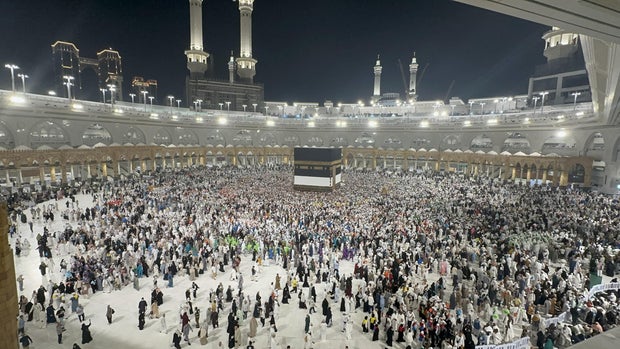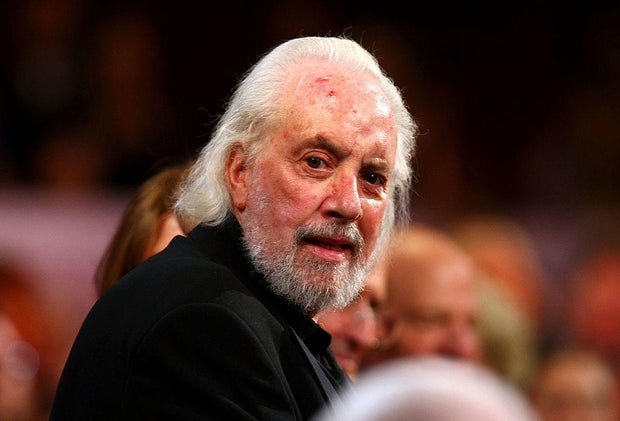CBS News
More than 1,000 people die at hajj pilgrimage 2024 amid extreme heat in Saudi Arabia, AFP reports

Riyadh — The death toll from this year’s hajj has exceeded 1,000, an AFP tally said on Thursday, more than half of them unregistered worshippers who performed the pilgrimage in extreme heat in Saudi Arabia. The new deaths reported Thursday included 58 from Egypt, according to an Arab diplomat who provided a breakdown showing that of 658 total dead from that country, 630 were unregistered.
All told around 10 countries have reported 1,081 deaths during the annual pilgrimage, one of the five pillars of Islam which all Muslims with the means must complete at least once. The figures have come via official statements or from diplomats working on their countries’ responses.
The hajj, whose timing is determined by the lunar Islamic calendar, fell again this year during the oven-like Saudi summer.
Issam Rimawi/Anadolu/Getty
The national meteorological center reported a high of 51.8 degrees Celsius (125 degrees Fahrenheit) earlier this week at the Grand Mosque in Mecca. Egyptian officials reached by CBS News would not confirm the figures stated by the AFP, but dozens of videos posted on social media in recent days showed bodies laying on the streets around the Grand Mosque.
According to a Saudi study published last month, temperatures in the area are rising 0.4 degrees Celsius, or just less than one degree Fahrenheit, each decade.
Every year, tens of thousands of pilgrims attempt to perform the hajj through irregular channels as they cannot afford the often costly official permits. Saudi authorities reported clearing hundreds of thousands of unregistered pilgrims from Mecca earlier this month, but it appears many still participated in the main rites which began last Friday.
This group was more vulnerable to the heat because, without official permits, they could not access air-conditioned spaces provided by Saudi authorities for the 1.8 million authorized pilgrims to cool down after hours of walking and praying outside.
“People were tired after being chased by security forces before Arafat day. They were exhausted,” one Arab diplomat told AFP on Thursday, referring to Saturday’s day-long outdoor prayers that marked the hajj’s climax.
FADEL SENNA/AFP/Getty
The diplomat said the principal cause of death among Egyptian pilgrims was the heat, which triggered complications related to high blood pressure and other issues.
In addition to Egypt, fatalities have also been confirmed to AFP by Malaysia, Pakistan, India, Jordan, Indonesia, Iran, Senegal, Tunisia and Iraq’s autonomous Kurdistan region, though in many cases authorities have not specified the cause.
Friends and family members have been searching for pilgrims who are still missing.
On Wednesday they scoured hospitals and pleaded online for news, fearing the worst during the scorching temperatures.
Saudi Arabia has not provided information on fatalities, though it reported more than 2,700 cases of “heat exhaustion” on Sunday alone.
CBS News
7/2: CBS Evening News – CBS News

Watch CBS News
Be the first to know
Get browser notifications for breaking news, live events, and exclusive reporting.
CBS News
Robert Towne, legendary Hollywood screenwriter of “Chinatown,” dies at 89

Robert Towne, the Oscar-winning screenplay writer of “Shampoo,” “The Last Detail” and other acclaimed films whose work on “Chinatown” became a model of the art form and helped define the jaded allure of his native Los Angeles, has died. He was 89.
Towne “passed away peacefully surrounded by his loving family” Monday at his home in Los Angeles, his publicist Carri McClure, told CBS News in a statement. She did not provide a cause of death.
In an industry which gave birth to rueful jokes about the writer’s status, Towne for a time held prestige comparable to the actors and directors he worked with. Through his friendships with two of the biggest stars of the 1960s and ’70s, Warren Beatty and Jack Nicholson, he wrote or co-wrote some of the signature films of an era when artists held an unusual level of creative control. The rare “auteur” among screen writers, Towne managed to bring a highly personal and influential vision of Los Angeles onto the screen.
Alberto E. Rodriguez/Getty Images for AFI
“It’s a city that’s so illusory,” Towne told The Associated Press in a 2006 interview. “It’s the westernmost west of America. It’s a sort of place of last resort. It’s a place where, in a word, people go to make their dreams come true. And they’re forever disappointed.”
Recognizable around Hollywood for his high forehead and full beard, Towne won an Academy Award for “Chinatown” and was nominated three other times, for “The Last Detail,” “Shampoo” and “Greystoke.” In 1997, he received a lifetime achievement award from the Writers Guild of America.
“His life, like the characters he created, was incisive, iconoclastic and entirely (original),” said “Shampoo” actor Lee Grant on X.
Towne was born Robert Bertram Schwartz in Los Angeles and moved to San Pedro after his father’s business, a dress shop, closed down because of the Great Depression. His father changed the family name to Towne.
Towne’s success came after a long stretch of working in television, including “The Man from U.N.C.L.E” and “The Lloyd Bridges Show,” and on low-budget movies for “B” producer Roger Corman. In a classic show business story, he owed his breakthrough in part to his psychiatrist, through whom he met Beatty, a fellow patient. As Beatty worked on “Bonnie and Clyde,” he brought in Towne for revisions of the Robert Benton-David Newman script and had him on the set while the movie was filmed in Texas.
Towne’s contributions were uncredited for “Bonnie and Clyde,” the landmark crime film released in 1967, and for years he was a favorite ghost writer. He helped out on “The Godfather,” “The Parallax View” and “Heaven Can Wait” among others and referred to himself as a “relief pitcher who could come in for an inning, not pitch the whole game.” But Towne was credited by name for Nicholson’s macho “The Last Detail” and Beatty’s sex comedy “Shampoo” and was immortalized by “Chinatown,” the 1974 thriller set during the Great Depression.
“Chinatown” was directed by Roman Polanski and starred Nicholson as J.J. “Jake” Gittes, a private detective asked to follow the husband of Evelyn Mulwray (played by Faye Dunaway). The husband is chief engineer of the Los Angeles Department of Water and Power and Gittes finds himself caught in a chaotic spiral of corruption and violence, embodied by Evelyn’s ruthless father, Noah Cross (John Huston).
Influenced by the fiction of Raymond Chandler, Towne resurrected the menace and mood of a classic Los Angeles film noir, but cast Gittes’ labyrinthine odyssey across a grander and more insidious portrait of Southern California. Clues accumulate into a timeless detective tale, and lead helplessly to tragedy, summed up by one of the most repeated lines in movie history, words of grim fatalism a devastated Gittes receives from his partner Lawrence Walsh (Joe Mantell): “Forget it, Jake, it’s Chinatown.”
The back story of “Chinatown” has itself become a kind of detective story, explored in producer Robert Evans’ memoir, “The Kid Stays in the Picture”; in Peter Biskind’s “East Riders, Raging Bulls,” a history of 1960s-1970s Hollywood, and in Sam Wasson’s “The Big Goodbye,” dedicated entirely to “Chinatown.” In “The Big Goodbye,” published in 2020, Wasson alleged that Towne was helped extensively by a ghost writer — former college roommate Edward Taylor. According to “The Big Goodbye,” for which Towne declined to be interviewed, Taylor did not ask for credit on the film because his “friendship with Robert” mattered more.
The studios assumed more power after the mid-1970s and Towne’s standing declined. His own efforts at directing, including “Personal Best” and “Tequila Sunrise,” had mixed results. “The Two Jakes,” the long-awaited sequel to “Chinatown,” was a commercial and critical disappointment when released in 1990 and led to a temporary estrangement between Towne and Nicholson.
Around the same time, he agreed to work on a movie far removed from the art-house aspirations of the ’70s, the Don Simpson-Jerry Bruckheimer production “Days of Thunder,” starring Tom Cruise as a race car driver and Robert Duvall as his crew chief. The 1990 movie was famously over budget and mostly panned, although its admirers include Quentin Tarantino and countless racing fans. And Towne’s script popularized an expression used by Duvall after Cruise complains another car slammed him: “He didn’t slam into you, he didn’t bump you, he didn’t nudge you. He rubbed you.
“And rubbin,′ son, is racin.'”
Towne later worked with Cruise on “The Firm” and the first two “Mission: Impossible” movies. His most recent film was “Ask the Dust,” a Los Angeles story he wrote and directed that came out in 2006. Towne was married twice, the second time to Luisa Gaule, and had two children. His brother, Roger Towne, also wrote screenplays, his credits include “The Natural.”
CBS News
Analyzing impact of Supreme Court’s Trump immunity decision

Watch CBS News
Be the first to know
Get browser notifications for breaking news, live events, and exclusive reporting.











